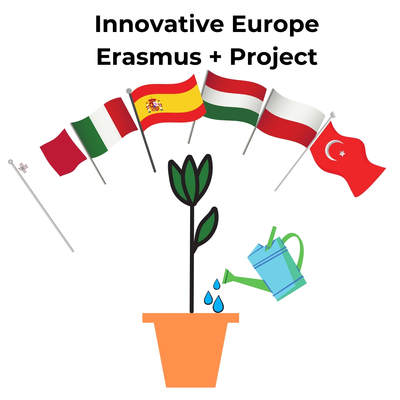Innovative Europe
Background
Early school leaving is one of the major challenges in education policy within the European Union.
According to Eurostat 2017 statistics of early leavers from education and training population in
percentage for ages between 18-24 age are ; Spain 18,3 %, Turkey 32%, Malta 18,6%, Italy 14%
and Hungary 12,5%. Reducing its incidence to 10% by 2020 has been one of the key benchmarks of
European education policy cooperation. In the partnership Poland will be model country for other
partners because early school leaving rate is under 5 %.
Objectives
General aim of our project is to strengthen and maintain near future “European Dimension” on the
partner schools. Also our aim is to establish a sustainable early school leaving tackling system on the
partner schools through cross-bordering cooperation. Aims are;
-To reduce the school dropout rates in the communities involved in the project
-To enable children with low marks to feel the joy of success in lessons by encouraging them
applying the methods Poland uses and with this to strengthen the connection with school.
-To share best practices for preventing early school leaving
-To prepare sample lesson plans and evaluation documents including inclusive education approach
for all lessons
-To improve knowledge of the pupils and staff on European Union, European languages and cultural
diversity
-To encourage students to learn foreign language and promote respecting other cultures and nations
-To encourage our students´ notion and feeling of active EU citizenship
-To develop a feeling that the students belong to a wide European diverse cultural family
Participants
Target group of the project is especially 12-14 years old students, who are in early school dropout
risk group and, will take part in all project activities. However, educational staff and school managers
will join the local and transnational project activities. Parents will join the local project activities.
Students are coming from poorly educated, social and economic background. Also students have
low marks at school and they have high absenteeism rate. They are strongly in need of support
through extra-curricular activities and mentoring teachers.
At the end of the project 141 students in total will join the short-term exchange groups of pupils, 19
teachers will join the short-term joint staff training events and 49 teachers will join as accompanying
people the short-term pupil exchange activity on partner schools. Besides, more than 450 pupils and
their parents and 120 teachers will join the local project activities.
Methodology
Partners strongly need a comprehensive project work across the entire school community to prevent
ESL through inclusive education approach, motivation of joining EU project and sharing best
practise.
Results
Main result of the project is the action plan which consists of 4 parts. Also Teacher Guide and EU
Science Book will be prepared at the end of the project. The project aims, active participation of the
students and educational staff to all international and local activities. Schools have a very important
role in reducing early school leaving. Schools should be a place where pupil feel comfortable and
supported, feel ownership of their own learning. Our goal is to be a school described above.
Impact
Expected impact of the project on pupils; increasing knowledge of European languages, culture,
history and geography, feeling the active EU citizenship and part of wide European Cultural Diversity
family. Learning about partner countries’ cultures, open a cultural dialogue, which will improve
tolerance and eliminate stereotypes by identifying and respecting the similarities and differences.
Besides the expected impact on educational staff there are; increasing knowledge of European
languages, culture, history and geography, fighting racism and xenophobia, feeling part of wide
European Cultural Diversity family, developing competence in planning and organizing projects.
Longer-term benefits
At the end of the project activity partners will gain a unique action plan which includes best practices
that is prepared by international cooperation to prevent early school dropout so they can benefit from
the plan after the project through their strategic plan for the next generations. The partnership will
provide well-supported citizens to the society on a long term basis.
Participating organisations
Turkey: Sehitler Ortaokulu
Malta: Newark School
Hungary: Üllés, Forráskút, Csólyospálos Községi Általános Iskola és Alapfokú Müvészeti Iskola Fontos Sándor Tagintézménye
Poland: Szkola Podstawowa nr 5 im plk Stanislawa Sitka
Italy: Istituto Comprensivo “Filippo Traina”
